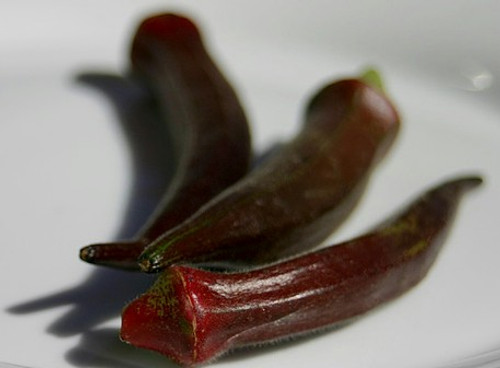Type: Open Pollinated / Heirloom
Relative Days: 49 – 60
Skin Color: Burgundy
Life Cycle: Perennial in warmer, frost-free regions but typically grown as an Annual in most climates
Characteristics:
Red Burgundy Okra is a visually striking variety bred by Leon Robbins at Clemson University and introduced in 1983, earning All-America Selections honors in 1988. This productive plant grows 4 to 5 feet tall and features green leaves with burgundy stems, branches, and leaf ribs. It produces tender 6 to 8 inch burgundy pods that hold their color and texture well, especially when picked young. In addition to its great yield and flavor, Red Burgundy adds ornamental value to any garden with its vivid contrast and rich southern heritage.
Okra (Abelmoschus esculentus)
Okra is a popular vegetable commonly found in both home and commercial gardens. A significant acreage is planted for the soup and frozen food industry. While new varieties of okra are not introduced as frequently as some other vegetables, plant breeders and commercial companies continue to improve existing varieties, with some hybrids being released.
Temperature
Plant okra when the soil temperature reaches at least 60°F for good seed germination. Okra thrives in hot, humid summers and requires warm areas with plenty of sunlight.
Soil
Okra grows best in well-drained, fertile soils with good water retention capacity. Avoid planting in very light, sandy soils or those with poor drainage or known hardpans.
Planting
Plant seeds 1 1/2 to 2 inches deep, placing 4 to 6 seeds per foot of row. Thin plants to 8 to 12 inches apart.
Spacing
- Within the row: 18–24 inches
- Between rows: 42–60 inches
Harvest
Okra grown for processing usually produces pods on brittle stems. These pods can be broken off with a snap, leaving the stem attached to the plant. For processing, allow the pods to grow as long as possible without becoming fibrous or hard. If the pod tip snaps off evenly, it is generally still tender.
For more information, please see links below:
Downloadable Copy:
Please click here to download a printable version.


